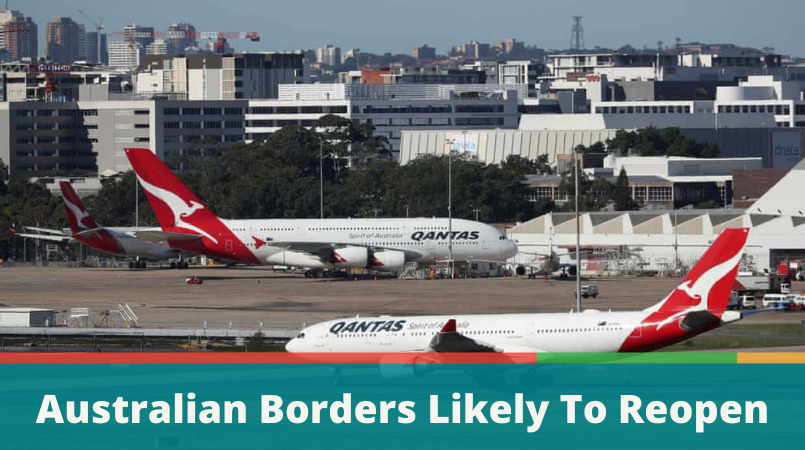
Federal government also extends Covid pandemic emergency powers for two months to enforce flight mask mandate and some travel restrictions.
Scott Morrison has signalled Australia is likely to open up to international students and skilled workers next week, while health authorities continue to weigh up whether to adjust the timing of booster shots.
The federal government revealed it would extend emergency powers for a further two months to February 2022, keeping in force mandatory mask wearing for international flights and restrictions on international travel from countries deemed high-risk.
The impact of the Omicron variant of Covid-19 was top of the agenda for the final national cabinet meeting of the year, but Morrison said his government was inclined to reopen to international students and skilled workers on 15 December.
That was originally due to happen at the beginning of December, but it was delayed to allow authorities to gather more information about the Omicron variant.
Asked on Friday whether the borders would open on that date, Morrison said the government was “taking more advice at the moment, but that is certainly our disposition”. He planned to “keep moving forward, not to go back”.
Despite Morrison’s upbeat message, the federal government has decided some measures need to remain in place for longer.
The chief medical officer, Prof Paul Kelly, briefed national cabinet that Australia was “still in the early stages of understanding the Omicron variant”, according to a summary issued by Morrison’s office.
The meeting noted that the federal health minister, Greg Hunt, had extended the human biosecurity emergency period under the Biosecurity Act to 17 February.
Hunt said the arrangements, which have been in place since March 2020 “to protect Australians during the Covid-19 pandemic” and extended several times, would continue based on health advice.
Hunt said the two-month extension would “allow the important measures currently in place to continue as the government continues to reopen Australia and act decisively to respond to the emergence of the Omicron variant”.
That would see the extension of mandatory pre-departure testing and mask wearing for international flights, restrictions on international travel from high-risk countries, and restrictions on outbound international travel for unvaccinated Australians.
But the federal government is keeping open the option of revoking any of these rules earlier than February “to take into account the latest medical advice”, as more information is gained about Omicron.
The extension will also continue restrictions on the entry of cruise ships to Australia. But Hunt said the government would “continually review, on a monthly basis, whether the current restrictions on cruise ships can be safely lifted or amended”.
The meeting also received an update from the national vaccination coordinator Lt Gen John Frewen on administering vaccine boosters and delivering them across Australia.
That follows the announcement that children aged five to 11 will be able to receive the Pfizer Covid vaccine from 10 January.
The Labor MP Alicia Payne told Sky News: “I think parents will really welcome this approval for children. I know many parents have been really hanging out and waiting for their children to be able to be vaccinated.”
Fewen briefed leaders “on the plans to close the gap in vaccination rates between Aboriginal and Torres Strait Islander Australians and the general population, and on preparations under way to administer Covid-19 vaccines to children aged 5 to 11 years, including targeted communication strategies”, Morrison’s statement said.
National cabinet decided to update existing Covid-19 outbreak management plans to protect Aboriginal and Torres Strait Islander communities “in light of the Omicron variant and current outbreaks in the Northern Territory”.
The Northern Territory detected four Covid cases in Katherine, as a cluster linked to three crowded households continued to grow.
Earlier, Morrison gave a hint that the federal government was considering bringing forward booster shots.
“We are continuing to review the evidence about how that time period for the booster shot might be able to be reduced … and we’re working with the medical experts on those issues,” he told reporters in Sydney on Friday morning.
Morrison played down the severity of the illness caused by Omicron, saying that was “potentially quite a game changer with the pandemic around the world about how the virus may well step down, but we’ll see”.
National cabinet is next due to meet in February, when it will consider fresh advice from Kelly and the Doherty Institute on what threshold should be met to move to phase D of the national reopening plan.
The meeting on Friday noted “significant progress in reopening Australia”, with Western Australia set to reach 80% over-16 double-dose vaccination coverage within days, meaning all parts of the country will have entered phase C of the plan.
Morrison told 2GB radio he did not believe state premiers would rush again to close domestic borders, suggesting the response to the Omicron variant had been “a good test” of holding their nerve.
He praised the South Australian premier, Steven Marshall, for not closing the state border and the Queensland premier, Annastacia Palaszczuk, for the imminent reopening of its border.
Morrison urged all Australians who had their second Covid-19 vaccine dose at least six months ago to come forward to receive booster shots, “because that will be important as we go into next year”.
Queensland reported on Friday four new locally acquired Covid-19 cases and two interstate-acquired cases out in the community.
Queensland’s health minister, Yvette D’Ath, said a Gold Coast lockdown was unlikely but urged residents to get vaccinated and wear a mask. “Today is the day that we’ve been planning for,” she said.
Victoria recorded two new cases of the Omicron variant among travellers who landed in Melbourne from Dubai on 30 November.
Story first published on The Guardian
